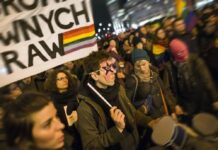More reports of threats of violence towards LGBTI football fans planning to attend the next Football World Cup in Russia have surfaced, leaving many concerned for their safety should they attend.
According to reports by the Mirror, Pride In Football, an alliance of LGBTI football fan groups in the United Kingdom, have received emails from Russian hooligans who threatened to target LGBTI visitors.
“We’ve had people say that if they find us they’ll stab us, so it’s been a mixture but they’re being dealt with seriously and those investigations are still ongoing,” Joe White, Pride in Football’s campaign leader, told the newspaper.
Despite the threats, White insisted that he would not be going back into the closet while in Russia. “If it’s safe to do so we’ll be taking rainbow flags, hopefully getting some form of visibility in stadiums to show that LGBT football fans do exist and, just as much as any fan, we’re a valid part of the game,” he explained.
“Unless there is someone kind of putting their head above the parapet, it’s very easy for them to say we don’t exist,” White added.
Currently under Russia’s so-called “gay-propaganda law,” it is effectively illegal to display any representation of the Rainbow community or to show same-sex affection in public.
Following the law’s introduction, it has not only been used to ban Pride events and restrict LGBTI websites but has also fueled anti-LGBTI sentiment throughout Russia and Russian influenced states.
In response to the threats and concern surrounding Russia’s anti-LGBTI legislation, the Russian Football Union’s Alexei Smertin, a World Cup ambassador, told the BBC that “If you are talking about rainbow flags, it won’t be prohibited in Russia during World Cup or afterwards. It definitely won’t be stressful and we let everyone feel comfortable and safe in our country.”
Smertin was also quoted by the Independent as saying that, “You can kiss all you like, and hug one another, within the bounds of normal reason.”
Despite Smertin’s reassurance, the Football Supporters’ Federation (FSF) continues to remain sceptical, and instead published advice on its website for LGBTI fans attending the event, stressing that “it is strongly understood and advised that you do not publicly display your sexuality, but this is up to the individual.”
The advice also noted that, while “we can’t guarantee safety,” it was unlikely that the authorities would take any action against LGBTI visitors “during this time when the world’s media will be focused upon the country.”
Athletes and fans who attended Russia’s Sochi Winter Olympic Games in 2014 also faced similar fears, notably when Italian transgender activist Vladimir Luxuria was arrested after she walked around the host city’s Olympic Park wearing a rainbow outfit and headdress and shouting “Gay is OK” and “It’s OK to be gay” in English and Russian.
Russia’s 2018 FIFA World Cup will take place throughout Russia from the 14th of June till the 15th of July 2018.

















